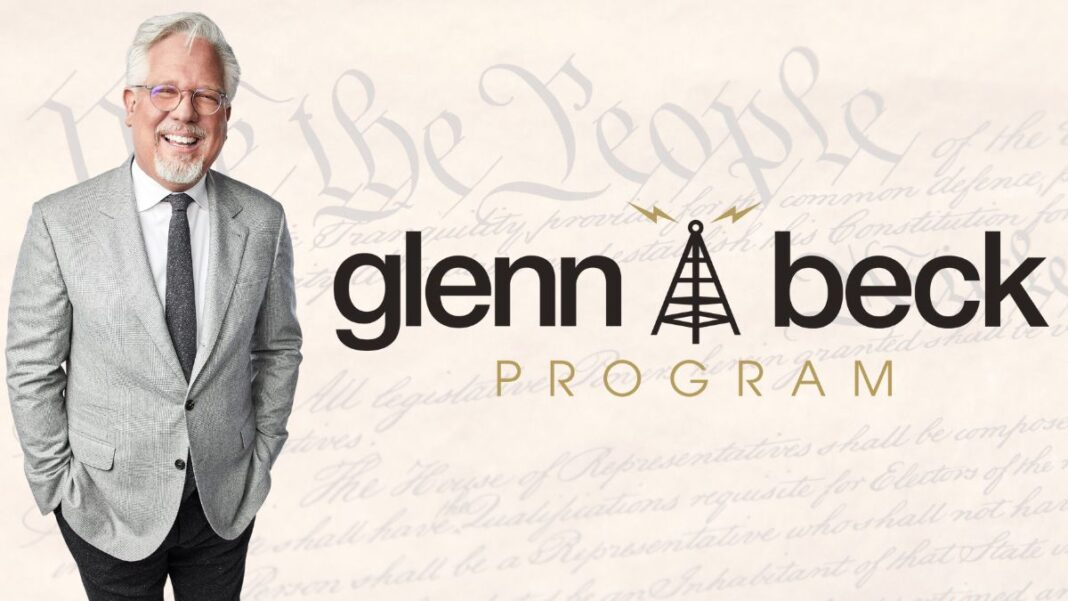He is one of the masters of radio. The beginning of the love of the art form began for Glenn Beck at 7 years old, when his mother told him to turn off the TV. “I said, ‘You watched TV when you were a kid,’ and she told me the most amazing thing. She said, ‘We didn’t have TV when I was a kid.’ and I was like, ‘Wilma Flintstone has a TV. How old are you?’”
Captivated by ‘The Golden Years of Radio,’ ‘Orson Welles,’ ‘War of the Worlds,’ ‘Jack Benny,’ and so many others, the host of The Glenn Beck Program found his calling early in life. “The mechanics might change. The style may change. But the art of it never changes.”
Saying he “won the lottery,” the Radio Hall of Famer noted he is “amazed every day I’m on the air.” It took him 30 years to become the super star we all know today, and it almost didn’t happen. “I was going to quit,” he said. “I was 31 and my dad said, ‘You’ve known what you wanted to do since you were 7 or 8, but you have to find what you are and then just do that.’ So, I started doing that and I didn’t get into talk radio to take it seriously. I was actually kind of making fun of it and then here we are.”
Today’s talk radio, however, is no laughing matter. This election cycle is being watched closely and many listeners are turning to Beck for his break down of the day’s political banter. “We have to find our reason again as a society,” Beck said. “We have to stop being so tribal. We’re all living in our lizard brain and nothing good is going to come of that and so we need to find our first principles again.”
Known for his bold commentary, Beck is growing more concerned for the road ahead after the second attempt on President Trump’s life. “If we don’t find our first principles, pretty soon, society is going to break down.” he said. “The America that I grew up in, the Constitution and Bill of Rights, where the Bill of Rights actually means something, I think we’re at the end of that road. Hopefully people will wake up, but I think we’re at the last exit. I really do.”
Candidly speaking, Beck believes the American system was never meant to be so large and “controlling on so many things. That’s not what it was designed to do. So, all of our problems are coming from the abandoning of the Bill of Rights and the Constitution.”
Regardless of who wins in November, he wants a reduction of executive branch power. “I don’t know anybody growing up that was ever afraid of the president, and we had bad presidents, but nobody was ever afraid of them because they didn’t have enough power. We have lost the balance of power.”
The founder of TheBlaze later added, “The executive branch under Donald Trump, under Joe Biden, under anybody has got to be reduced in power. A sign that we are out of balance is when somebody thinks the president can affect their life. That should never happen in America. Never.”
Not everyone agrees with Beck (especially those on the left side of the aisle), yet he welcomes the naysayers – provided they are earnestly seeking answers.
“Don’t ask me questions to trap me,” he said. “Ask me questions because you’re actually, honestly, seeking an answer, and you don’t know what it is. If you find that answer to be wishy washy, then ask me another honest question. If you make your point, then I have to accept. Either you believe that, or you might change my mind. I suddenly see logic that I’d never seen before and now I have a choice, am I going to change or am I going to deny what I just found true?”
Beck noted the importance of disagreeing because this makes ways for advancement. “We only make progress when there is that rub but it should be appreciated. It should be celebrated. Wow. Gosh, I’ve never thought of it that way. Wow. I’ve been wrong. I’ve so wanted to be wrong for a long time and I’ve been wrong a ton of times. But only time has told me that I was wrong. The naysayers all they’ve ever done is call me names.”
At the end of the day the name calling doesn’t matter, yet it is the truth which will set America free. “[Find the right answer] is what we’re supposed to be doing, especially if we’re in the media.”
But according to Beck, the media today has also lost its true American way. “The media is a state-run operation now,” he said. “It’s a problem and proof of that is the last debate. That was insane.
“If the roles were reversed and Kamala [Harris] had been shot and almost killed, the very first question would have been and should have been, ‘President Trump, Vice President Kamala Harris was almost killed. She was shot. We’re glad she’s here. We’re glad she’s safe. Violence has no place in American politics. President Trump, how do you respond to one of your supporters having tried to shoot and kill her?’ That would have been the first question and that’s a logical place to start. [ABC] didn’t even mention it.”
He equated the fact checking of Trump and lack thereof for Harris to elementary school antics. “[Harris] told like third grade lies that are so easily provable and they just let them slide. That’s not a media outlet that’s a PR group. It’s propaganda.”
When asked if there is propaganda coming from the right side of the aisle as well, Beck agreed. “Yeah, sure there is. Propaganda is what advertising used to be called. Edward Bernays was a nephew of Sigmund Freud. [Bernays is] the father of advertising. He was actually called the father of propaganda until the Germans took all of his teachings and applied them and then they were like, ‘We shouldn’t use propaganda. Let’s call it advertising.’”
Insightful and thought provoking, Beck’s commentary is the side most know of the famed radio man. Yet there is so much more to the human enigma which goes overlooked, under-sought, and hardly advertised.
An accomplished painter, philanthropist, and entrepreneur Beck is humble about the work he does outside of his radio gig. Most notably, he is the founder of Mercury One, a charity foundation which partners with ministries and non-profits around the globe to restore communities and support our veterans.
Established in 2011, Beck recalled how Red Cross relief on September 11, 2001, played a large role in the beginnings of Mercury One. “I remember right after 2001; everybody gave money to 9/11 charities. A lot of people gave it to the Red Cross. I remember three years later, I was going through the Red Cross records and noticed they spent tens of thousands of dollars on new phone systems, and I thought, ‘I don’t think anybody gave that money, hoping that the Red Cross would get a new phone system.’”
With this in mind Beck looked for a better place to donate to, “I thought, ‘I can’t give to another charity unless I know that most of the money is going to the thing that we gave it for.’”
After leaving Fox News, Beck got to work equipping and empowering ethical non-profits. “I’ve always known that the only thing that will save us is being good to each other, helping each other,” he said. “If we want the government to do less, we have to do more. We have to pick up the slack. That’s the way it was designed. That’s the way it was meant. So how can we encourage people to help each other?”
The media mogul hosts a fundraiser each year which pays for anything Mercury One might need, including phone systems and salaries. By working in this fashion everything Beck raises on air will go directly to give aid to those who need it. “That way it’s transparent and safe,” he said. “But we didn’t reinvent the wheel. We take our money, and we look for somebody who’s already in the space doing it and doing it well and ethically, so we help them do it. We’re really more of a financial house than anything else. And we look for great, solid partners.”
For those looking to follow in Beck’s footsteps his advice is simple, “Find good mentors,” he said. “I was lucky enough to have Michael Shea, this incredible broadcaster back in the 70s and 80s, and he taught me so much. He told me, ‘Don’t work for anybody that you don’t really respect if you can and don’t listen to anybody on radio who isn’t better than you because you’ll pick up their bad habits.’ And I’ve always surrounded myself with people that are smarter than me, that can teach me something.”
He later noted, “I’d just find somebody good and just suck their brains out until they are dry. Learn everything you can as you will learn from the bad things. You will learn from their experience. This business is also art. It is also intellectually rigorous. If you can balance all three of those things and do it with excitement and zeal, you’ll own the world.”

Krystina Alarcon Carroll is a news media columnist and features writer for Barrett Media. She has experience in almost every facet of the industry including: digital and print news; live, streamed, and syndicated TV; documentary and film productions. Her prior employers have included NY1 and Fox News Digital and the Law & Crime Network. You can find Krystina on X (formerly twitter) @KrystinaAlaCarr.









